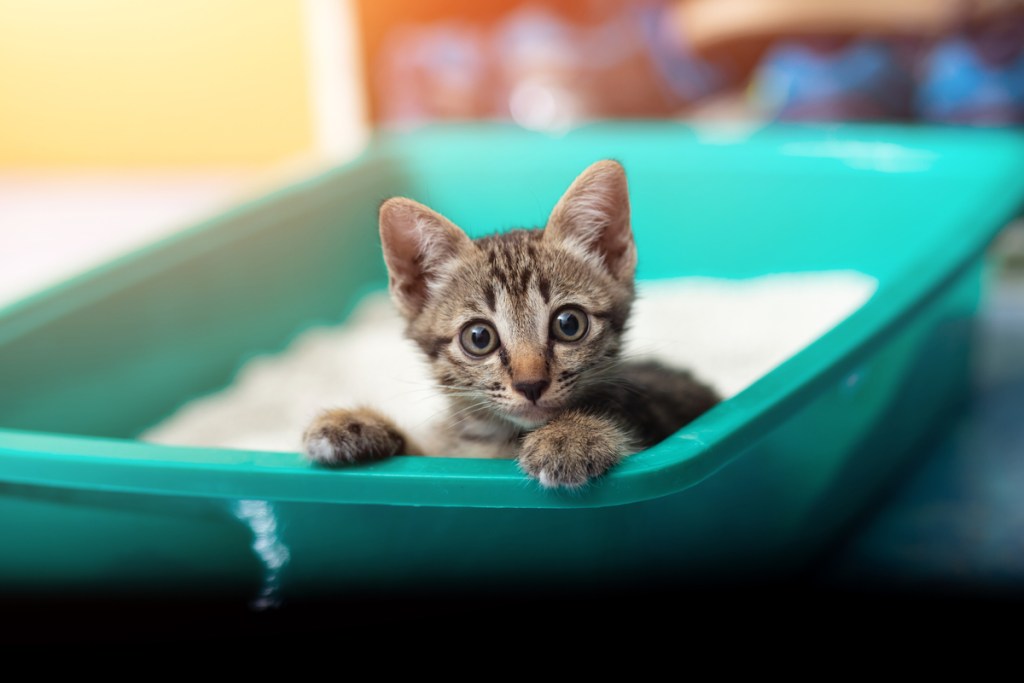
Cats are as unique as their human family members; each frisky feline has their own likes, dislikes, and funny mannerisms. Some cats get along well exclusively with other cats, while others love dogs. But one universal trait all cat parents recognize is their fastidious nature when it comes to grooming. When cats are widely known for being notoriously picky, you may be shocked to find your cat taking a nap in the litter box. Whether your fur baby takes cat naps in the litter box or paces around crying, you probably know they’re trying to tell you something.
Cats lying in the vicinity of their litter box could be healthy, but this strange behavior could be a warning sign of an underlying health issue. Have you ever wondered, “Why is my cat lying in the litter box?” You’ve come to the right place.
Why is my cat lying in the litter box?
1. Your cat’s feeling stressed
Sometimes, cats sleep in their litter boxes when they’re highly stressed. This is particularly common after you’ve moved to a new home. When your cat’s environment has changed, they may seek out anything familiar that they can find, including their litter box.
If your cat’s behavior is prompted by stress, you may need to find ways to help them feel secure. You might place some blankets containing your cat’s scent in a box next to the litter box. With some time, your cat should start to explore the home and feel more confident.
2. Your cat wants privacy
In some cases, cats may see their litter boxes as private spaces, and your cat might choose to retreat there for a nap. This is particularly common with enclosed litter boxes, which mimic the quiet security of other spaces cats like, like closets and cardboard boxes.
If your cat seems to be sleeping in the litter box simply because they enjoy the privacy, then you may be able to change their behavior by giving them other spaces to snooze. Your cat might enjoy hiding out in cardboard boxes or on a cat tree with a perch that lets them get up above the action.
3. Your cat is marking their territory
Your cat may be sleeping in their litter box in an attempt to claim it as their property. If there are other pets in the household, your cat may be feeling defensive and be trying to keep other pets away from what they’ve decided is their space.
Adding more litter boxes to the home can help your cat to feel more confident and may reduce the need your feline feels to mark their territory. If you’ve just introduced a new pet to the home, taking steps to keep that pet more separated from your cat for a more gradual introduction may also help.
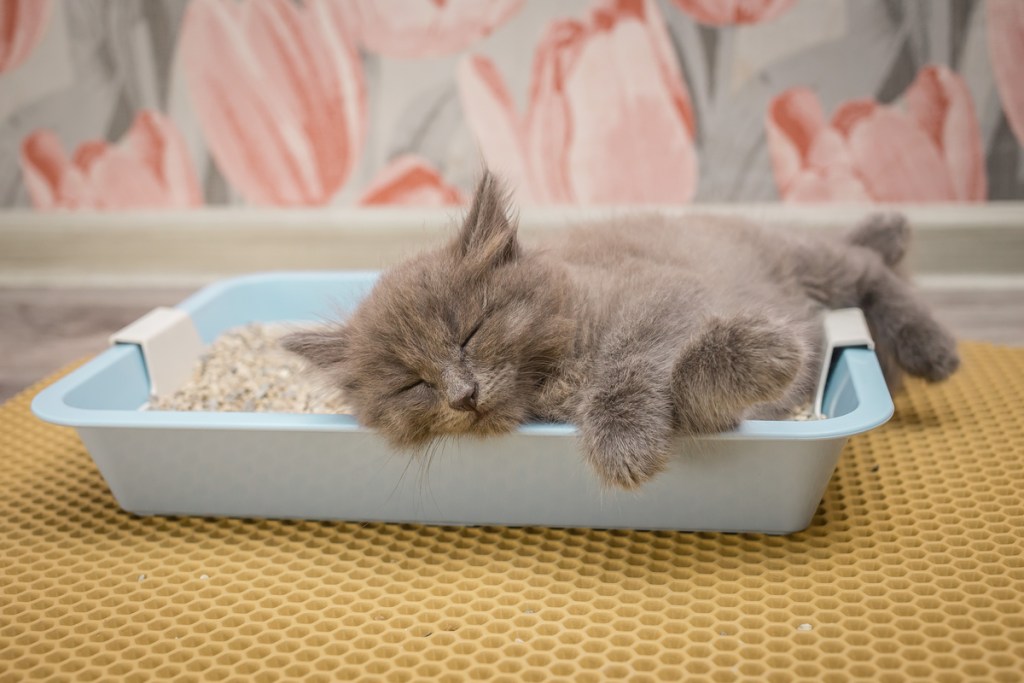
4. Your kitten is sleepy
Kittens learn a lot during their first weeks of life, and understanding what the litter box is for is a task that can take some time. Your kitten will learn to use the litter box by watching their mom, and sometimes litter box sides are challenging for kittens to climb over. If you find your kitten snoozing in the box, they may have just gotten tired and needed a nap.
The solution? Give your kitten some time — chances are they will figure out that napping in the litter box isn’t all that great soon enough.
5. Your cat thinks it’s comfy
Some cats may find the litter box comfy, especially if you’ve recently changed the type of litter that you’re using. A cat may be confused by the new texture and smells in the litter box, and your feline might find a soft litter, like recycled paper, to be comfy and the perfect spot for a nap.
To avoid this issue, make any litter changes gradually. Start by mixing in just 1/4 of your new litter, then gradually increase that new litter while reducing the amount of old litter in the box. Your cat will have some time to get used to the new litter and will have the chance to associate it with the place to do their business, instead of doing their sleeping.
6. Your cat likes the way their litter box smells
While we may cringe when we catch a whiff of the pungent smell of ammonia, it turns out that your fur baby might actually enjoy napping in their litter box because of the smell, not in spite of it. Their sensitive noses allow them to pick up on the scent of their pheromones, making the litter box feel like a safe place for them, no matter how stinky.
To counteract this unusual sleeping arrangement, make sure your cat has access to bedding that carries their scent.
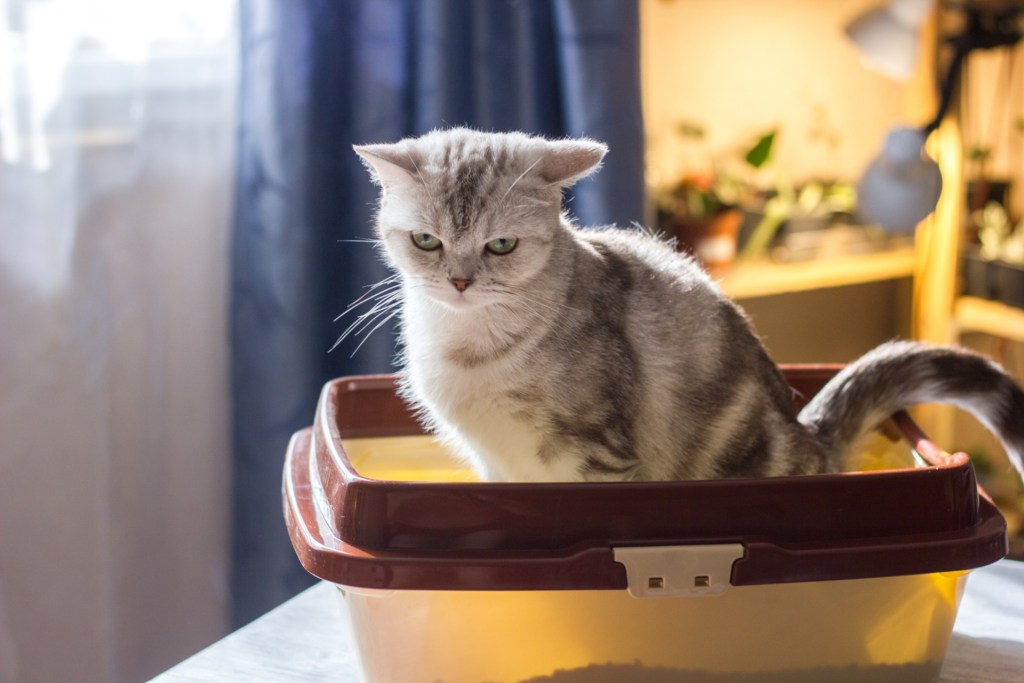
7. Your cat is newly adopted
Some cats take a while to get accustomed to their new surroundings. If you just adopted your cat from a shelter, they may be used to sleeping in a small space close to or in their litter box. The enclosed space of the box may feel more comfortable to them, especially during the stress of moving to a new home.
To help your cat feel more comfortable sleeping outside the litter box, give them a small space to sleep in. This could be a cardboard box, a covered cat bed, or a carrier with a blanket in it. As long as the space is compact and secluded, chances are good your cat will sleep there.
8. Your cat’s uncomfortable or sick
Sleeping in the litter box can indicate that your cat is uncomfortable. One of the most common reasons why cats sleep in their litter box is because of medical issues. Cats with kidney disease, urinary tract infections, constipation, or other digestive problems may sleep in their litter box when they’re not feeling well. If your cat is struggling to go to the bathroom, or they think they may not make it back in time, they may decide it’s best to stay close by. Some cats that are suffering from an advanced stage of dementia may also sleep in their litter box.
If you suspect your cat is ill, take them to the vet for a proper diagnosis. The veterinarian will be able to ease their pain and solve their digestive troubles. Once their medical condition is addressed, they should refrain from sleeping in the litter box once again.
9. Your cat is in labor
Is your cat pregnant? Typically, when female cats are on the verge of giving birth and do not have a private place to do it, they will seek shelter in their litter box. If your cat is pregnant, do some research so you can create a proper space for her to give birth where she and her babies can feel safe.
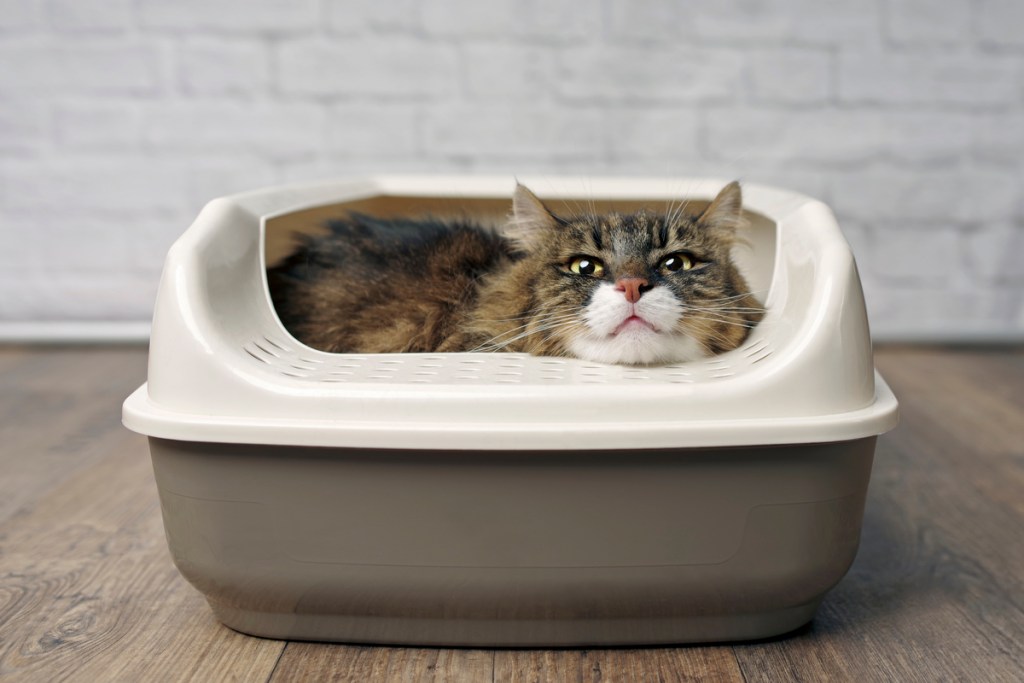
What to do about your cat lying in the litter box
Keep in mind that this is likely a temporary behavior, as one of the explanations above might be to blame for your cat’s affinity for the litter box. Be sure to consult your veterinarian just to make sure there isn’t some sort of medical issue going on. And if your kitty’s health checks out and all else fails, you can always make a habit of changing the litter much more often or right after you notice your cat using it. Hopefully, in time, your sweet friend will find a much more comfortable place to curl up for a nap.
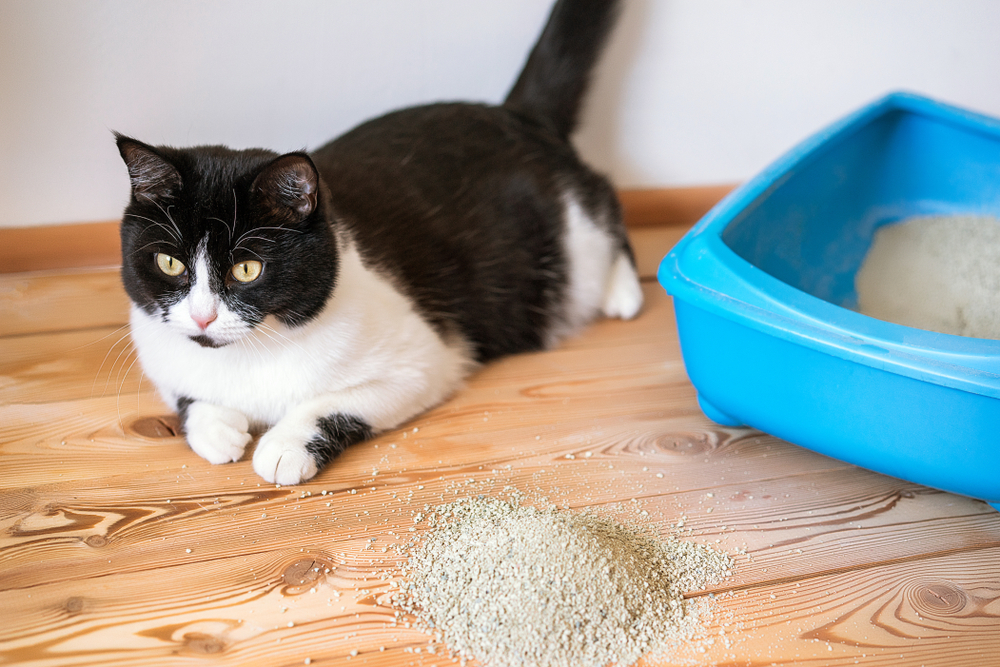
Final thoughts
If you find yourself wondering, “Why is my cat sleeping in the litter box?” then one of these situations might be the answer. If you can’t identify the cause of your cat’s sleeping in the litter box, or if you suspect a health issue might be to blame, then schedule an appointment with your vet. A check-up can help to identify any health issues that may need treatment, and once your cat is more comfortable, they should go back to their regular sleeping habits — outside the litter box.
Editors' Recommendations
- Wondering why cats chirp? Fascinating reasons why your cat chirps at birds (and you)
- How to cat-proof your balcony before the unthinkable happens
- There’s a totally normal reason cats throw up after eating grass – here’s why
- When can kittens leave their mom? Don’t separate them too early
- When do kittens’ eyes change colors? The answer is so cool – here’s what to know



